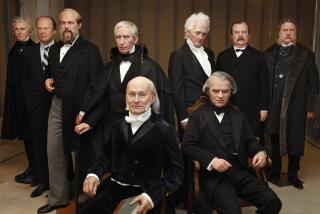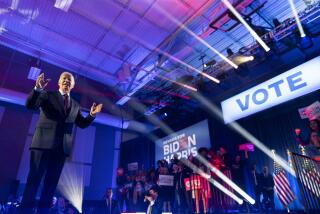Bush Faring Well in the Polls--Compared to Predecessors
The last few weeks have not been kind to George Bush. First, Dick Thornburgh, his political kinsman in Pennsylvania, suffered a humiliating defeat in a U.S. Senate race. Now, every new poll seems to show the President’s political fortunes worse than the day before. But such results should be read with caution.
The President’s latest job approval scores--56% as measured by Gallup during Nov. 7-10 and 55% as pegged in a Times Mirror nationwide survey from Oct. 30 to Nov. 10--are down sharply from his 80%-plus readings of six months ago and off 6 to 10 points from readings taken in recent weeks. Times Mirror’s new survey shows Bush now running neck and neck against a hypothetical Democratic candidate. A month ago, Bush won such a contest decisively, by 55% to 37%.
Bush is clearly no longer the political superman he was last spring at the end of the Persian Gulf War. Still, his public support remains impressive when compared to his recent predecessors’ popularity at this point in their terms.
Consider where Bush’s four presidential predecessors stood in the polls in the autumn before the primary season began.
At this point in his first term, in November, 1983, President Ronald Reagan had a 53% positive job performance score in a Gallup poll, just under Bush’s rating now. Reagan was tied in trial heats with Democratic front-runners Walter F. Mondale (47% to 48%) and Sen. John Glenn (47% to 47%). Reagan ended up beating Mondale, the eventual Democratic nominee, by 18 points a year later.
Only 38% of Americans gave President Jimmy Carter a positive job performance rating in a November, 1979, Gallup survey, even after Carter had received a bump in support with the onset of the Iranian hostage crisis. Just 41% approved of President Gerald R. Ford in early November, 1975.
Despite their low ratings, both presidents remained competitive in hypothetical Gallup matchups against leading political opponents (Carter against Ford and Reagan; Ford against Hubert H. Humphrey, Henry Jackson and Edmund S. Muskie). Both men ended up losing.
President Richard M. Nixon, facing economic problems and the Vietnam War, had a 50% positive approval rating in a November, 1971, Gallup poll. As Reagan did in 1983, in hypothetical face-offs Nixon virtually tied with top Democrats Muskie and Sen. Edward M. Kennedy that month (Nixon got 44%; Muskie and Kennedy each got 41%.) A year later, Nixon trounced eventual Democratic standard-bearer Sen. George S. McGovern by 23 points.
Right now, Bush beats New York Gov. Mario M. Cuomo by 58% to 37%, according to the new Times Mirror survey. Many surveys have found that Cuomo, who has yet to announce whether he will run, is the Democrats’ most preferred candidate. He was picked by 30% of Democrats polled in Times Mirror’s survey, for example. But nationwide surveys before the primaries begin are notoriously poor at predicting nominees. For example, both Carter and McGovern trailed better known Democrats in their races but eventually won the nomination.
Bush’s recent decline in popularity is not all that surprising--it follows the adage that American presidents’ political fortunes are tied to the economy. Economic conditions will provide the setting for next year’s political battle--and the worse off the economy is, the harder Bush will have to run.
Reagan had one advantage that Bush does not seem to have now. Reagan’s ratings were climbing as he entered his reelection year, buoyed by an economy clearly in recovery.
But polls throughout this year have indicated that consumers have stubbornly refused to accept the idea that a recovery is under way, and, if anything, they are more pessimistic than in the spring.
Those who doubt that a Democrat can win under any conditions would do well to remember how important the 1983 recovery was to Reagan’s eventual reelection victory. Before that recovery, Reagan’s Gallup approval score dropped as low as 35% and he actually trailed Mondale and Glenn in trial heats.
More to Read
Get the L.A. Times Politics newsletter
Deeply reported insights into legislation, politics and policy from Sacramento, Washington and beyond. In your inbox three times per week.
You may occasionally receive promotional content from the Los Angeles Times.










